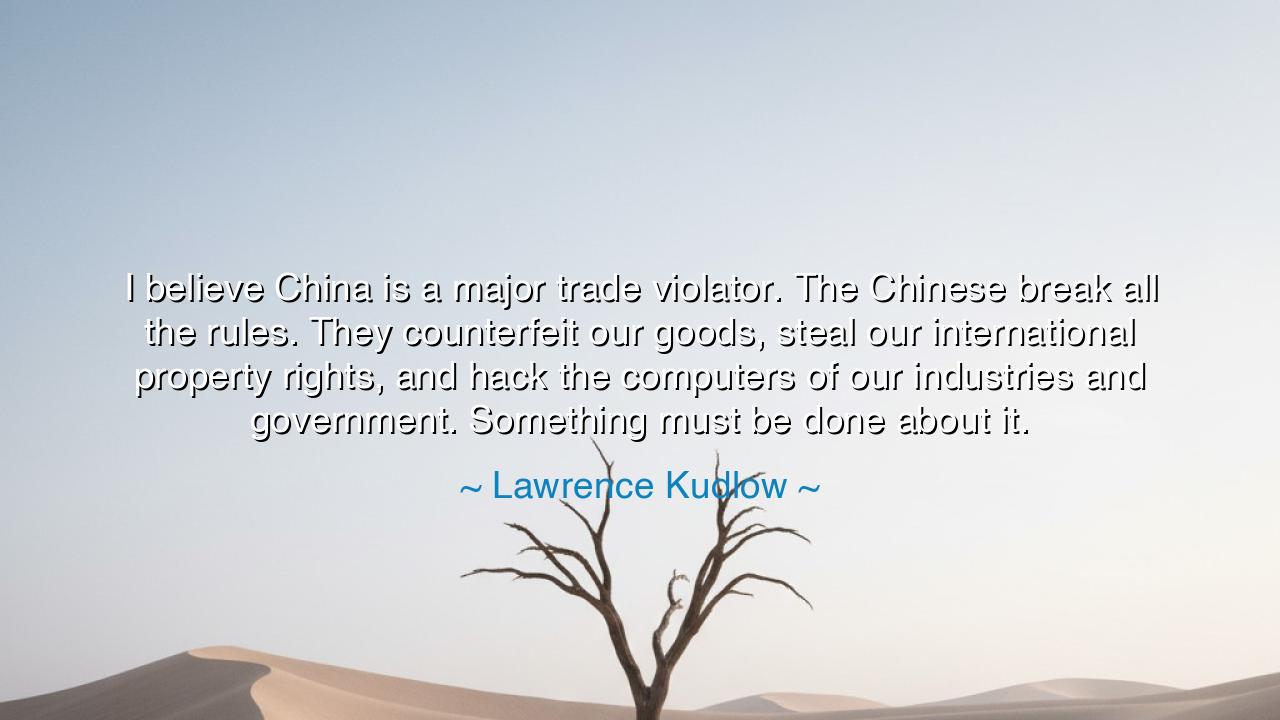
I believe China is a major trade violator. The Chinese break all
I believe China is a major trade violator. The Chinese break all the rules. They counterfeit our goods, steal our international property rights, and hack the computers of our industries and government. Something must be done about it.






The economist and statesman Lawrence Kudlow, known for his fierce defense of free enterprise and American prosperity, once declared: “I believe China is a major trade violator. The Chinese break all the rules. They counterfeit our goods, steal our international property rights, and hack the computers of our industries and government. Something must be done about it.” In this declaration burns the voice of a man who has long stood at the gates of economic power, warning that trust, when betrayed, demands response. His words are not merely political; they are moral—an appeal to justice, sovereignty, and the sanctity of honest labor. To understand his meaning, we must look beyond the nation he names and see the timeless conflict he describes: the clash between integrity and deceit, between those who create and those who steal, between builders and plunderers.
In the ancient world, trade was sacred. The Phoenicians, masters of the sea, built civilizations upon it. The Greeks and Romans guarded the purity of their coinage, for false currency was considered an offense not only against man but against the gods. For commerce, rightly ordered, is a form of covenant—a promise between peoples that goods, knowledge, and labor will be exchanged in fairness. When Kudlow speaks of rule-breaking, he evokes the same ancient wound that occurs when such a covenant is shattered. For to counterfeit or to steal another’s invention is to wage war not only on nations, but on the very principle of creation itself.
The origin of Kudlow’s warning lies in the modern age of global interdependence. As the world’s economies became entwined, the balance between cooperation and competition grew fragile. In this interconnected order, nations began to rely on the invisible flows of data, technology, and intellectual property—the lifeblood of modern progress. Yet in that very web of connection came the seeds of exploitation. Kudlow’s charge that China has engaged in hacking, counterfeiting, and intellectual theft is not only a political stance; it is a cry for accountability in a world that has grown comfortable with convenience but careless with principle. He calls upon the conscience of nations to remember that prosperity without fairness is corruption.
We may look to history for echoes of this struggle. In the 19th century, as the Industrial Revolution transformed the West, Britain’s inventions—the steam engine, the textile loom, the telegraph—became the envy of empires. Yet even then, spies and counterfeiters sought to seize what others had labored to create. Knowledge that had been earned through sweat and sacrifice was stolen in shadows. This theft did not only cost wealth—it eroded trust. Trade became less an exchange of goods and more a battlefield of cunning. So too, in Kudlow’s modern era, the theft of digital secrets and intellectual property carries the same spiritual weight as the looting of temples in ancient times. It is not merely an act of greed, but of dishonor.
And yet, the purpose of his words is not vengeance—it is awakening. His declaration that “something must be done” is a call to the guardians of civilization to act not from anger, but from wisdom. The ancients understood that when injustice flourishes unchecked, it poisons the well of peace. But they also knew that justice must be tempered with prudence. The Romans, when betrayed by Carthage, did not destroy blindly; they demanded restitution, they negotiated, and when betrayed again, they acted decisively. So too must the modern world respond not with hatred, but with resolve—to defend fairness, protect innovation, and rebuild the laws of honorable exchange.
At the heart of Kudlow’s message lies a truth that transcends nations: that freedom is meaningless without responsibility. The markets of the world are like the agora of Athens, where merchants met under the gaze of gods and men alike. Each trader’s honesty sustained the community’s strength. If deceit were allowed, all commerce would crumble. Today, the gods have been replaced by algorithms, and the agora by global networks—but the principle remains unchanged. Trust is the foundation of prosperity. Once broken, it must be restored through truth and accountability.
So let the lesson be this: defend what is yours, but do so with integrity. Lawrence Kudlow’s words remind us that wealth without ethics is rot, and competition without honor is chaos. Each person, each nation, must be both creator and protector—building new things while guarding what is justly earned. When you see injustice, name it; when you see theft, confront it. But above all, do not let righteousness decay into resentment. For the strength of a people lies not only in their wealth, but in their character.
Thus, in the spirit of the ancients, let us take Kudlow’s warning as a call to vigilance. The world will always have those who break rules and those who uphold them—but history belongs to the latter. Protect your creations, value fairness, and demand truth in every exchange. For when honesty governs trade and respect guides rivalry, commerce becomes not war, but the heartbeat of civilization. And in that harmony, both wealth and wisdom endure.






AAdministratorAdministrator
Welcome, honored guests. Please leave a comment, we will respond soon